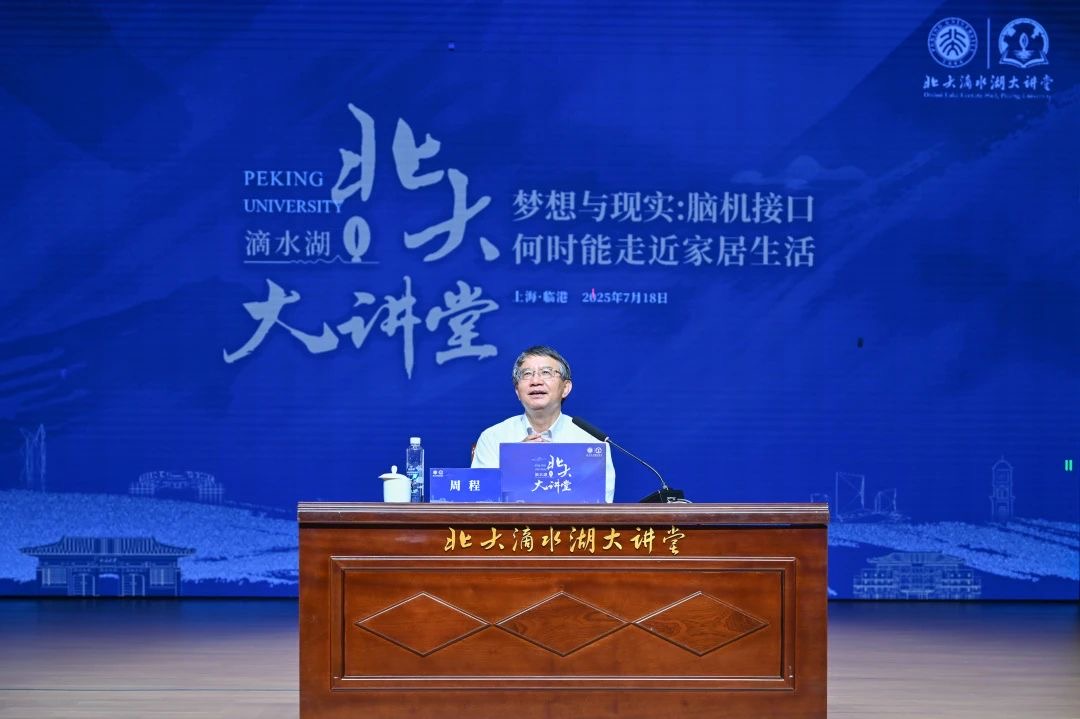Last night (July 18), the 24th lecture of Peking University Dishui Lake Lecture (PKU-DSLLH) was successfully held. Zhou Cheng, Professor and doctoral supervisor of the Department of Philosophy of Peking University, was invited to deliver a thematic lecture titled Between Dream and Reality: When Will Brain-Computer Interfaces Enter Household Life? at the Dishui Lake Theatre.

Professor Zhou Cheng commenced his analysis with Neuralink’s latest research advances in brain-computer interfaces (BCIs), providing an in-depth analysis of the current technological landscape and its challenges. He elucidated the core definition of BCI—"establishing a bidirectional communication pathway that bypasses peripheral nerves and muscles to connect the brain directly with external devices"—and systematically introduced three technical approaches: non-invasive, invasive, and interventional.Professor Zhou noted that current applications focus on therapeutic BCIs aimed at helping patients regain sensory, motor, and speech functions, while enhancement devices for healthy populations remain exploratory. Reviewing two decades of BCI breakthroughs, he detailed China’s innovations through case studies: Tsinghua University’s semi-invasive interface enabling independent drinking movements in paralyzed patients, the Chinese Academy of Sciences’ flexible electrode array allowing mind-controlled table tennis gaming, and Nankai University’s endovascular interface restoring motor functions in hemiplegic patients. Addressing technical bottlenecks, Professor Zhou highlighted persistent challenges across three dimensions: technical, theoretical, and ethical.

When discussing future prospects, Professor Zhou Cheng cited data indicating that the global BCI market is projected to reach $10.89 billion by 2033, with over one hundred related enterprises currently operating in China. He emphasized that while patent portfolios of leading companies and governmental policy support are accelerating technological implementation, BCI still faces tripartite ethical challenges: physical-layer risks (non-maleficence principle, brain modification, uncontrolled behavior risks), psychological-layer risks (agency vulnerability, informed consent dilemmas, privacy breaches), and societal-layer disputes (digital equity, accountability attribution), particularly highlighting potential technological equity imbalance from capital intervention. Professor Zhou concluded that BCI advancements may not be nearly as optimistic as the public perceives.

During the Q&A session, audiences raised questions concerning "the Technology Accessibility Gap" and "Privacy & Ethical Risks." Professor Zhou Cheng emphasized that technological democratization requires balancing market mechanisms with social regulation, noting that "just as automobiles enhanced work efficiency differentially— not uniquely in that field— BCI equity issues demand policy coordination." Regarding privacy and ethics, he proposed that technological advancement must be predicated on "societal co-governance," strengthening ethical frameworks to safeguard innovation.

Gong Hongbing, Member of the Party Working Committee of Lin-gang Special Area,attended the event and presented Professor Zhou Cheng with a commemorative lecture plaque. The session attracted over 200 on-site attendees, while digital platforms accumulated nearly 200,000 views through livestreams.

Before the lecture, Professor Zhou Cheng conducted an on-site inspection of PKU-IICSH, visited the Party-Mass Service Center on its first floor, and offered his kind guidance to the center's development.

Initiated with the support of the China (Shanghai) Pilot Free Trade Zone Lin-gang Speacial Area Administration (hereinafter referred to as Lin-gang Special Area, or LSAA), Peking University Dishui Lake Lecture Hall (PKU-DSLLH) is a collaborative effort involving Peking University International Sci-Tech Innovation Center at Lin-gang Special Area, China (Shanghai) Pilot Free Trade Zone (PKU-IICSH), Peking University Office of Science and Technology Development, and Office of Humanities and Social Science, and enjoying an active participation from Peking University Press, Peking University Alumni Association, and other relevant offices and departments. Leveraging Peking University's profound academic foundation and expert resources in the humanities and social sciences, PKU-DSLLH focuses on key areas including economic development, humanities and arts, and social governance.
Since August 2023, PKU-DSLLH has been hosting monthly lectures featuring renowned professors or expert scholars from Peking University, who provide specialized lectures and engage in in-depth discussions with residents in Lin-gang. As of this month, Peking University Dishui Lake Lecture Hall has held 24 lectures, attracting over 9,000 on-site attendees and accumulating nearly 1 million online views—effectively enhancing the cultural image and urban competitiveness of the Lin-gang Special Area.

